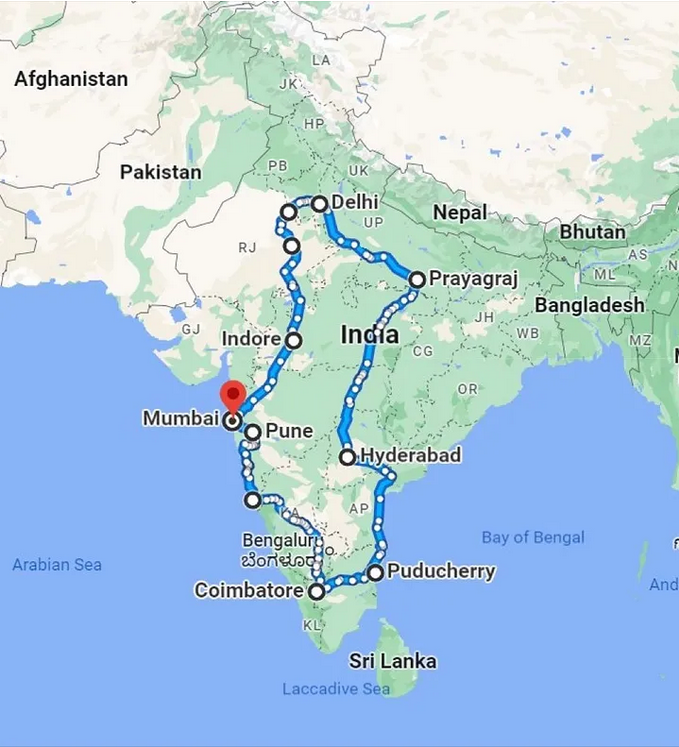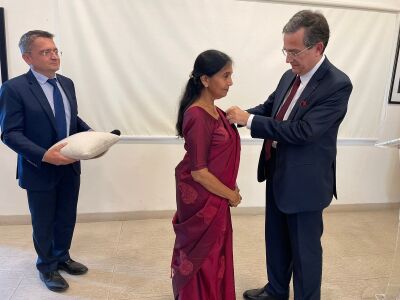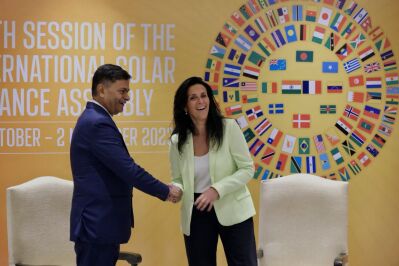 Actualités
Actualités 
Franco-Indian Alumni Making a Difference! An inspiring journey to promote sustainable living and a greener future - The SunPedal Ride!
Explore the remarkable journey of our alumnus sushil reddy, who completed the 60-day adventure, traversing 30+ cities, covering 7500+ emission-free kilometers in the Mahindra XUV400 electric car with Zero tailpipe emissions. This journey was undertaken from 12th September 2023 to 10th November 2023 with this daily route plan
Mahindra NBS International Ltd organised a flag-off event on World EV Day 2023 at their dealership in Mumbai in the presence of the XUV4OO EV and some team members.
It is important to reflect on the impact of collaborative campaigns in spreading the word about zero tailpipe emission mobility. Thank you Arushi Kumar Ankur Chachra and the Mahindra team for continuing to support the cause.
There was also a flag-off gathering by the team at Epsilon Advanced Materials Pvt. Ltd. who supported this e-mobility and sustainability outreach journey. Epsilon Advanced Materials was established in 2018 to mark its entry into Lithium-Ion Battery sector. Their vision is to develop and manufacture innovative, high performance and quality carbon products for anode components of lithium-ion Batteries (LIB). Thank you Vikram Handa and the entire team at Epsilon for believing in the awareness cause and supporting the journey!
After a brief pitstop at the Gateway of India in Mumbai, the journey headed towards Nashik while exiting Mumbai via the Eastern Express Highway.
To factor in for the uphill climb at Igatpuri ghat section on NH47, a buffer of ~90 extra kilometres of charge was ensured in the EV. There was a charging pitstop made on the outskirts of Mumbai for a 15 kWh top-up charge. PlugShare is a good resource to discover EV charging stations. Mumbai-Nashik is decently electrified with mutiple options to charge an EV. Overall, a distance of ~220 kilometres were covered today with the battery consumption of ~30 kWh (units)
There were student interactions organised at Sandip University and Symbiosis Institute of Operations Management — SIOM in Nashik. Courtesy Dr. Bishal Dey Sarkar Vandana Sonwaney.
The Mahindra XUV400 EV demo was given to the students. The topics of discussion were broadly about the importance of electric mobility from a decarbonisation point-of-view, EV batteries and recycling. On the topic of recycling, LICO Materials is a company in the domain of recycling of EV batteries (Gaurav Dolwani)
DC fast charging is an option in the city of Nashik with quite a few options of CPOs (Charge Point Operators) to choose from. We stopped at one 30 kW DC fast charger which was hosted within the parking premises of The Circle Hotel. The EV was plugged-in for ~50 mins for a 25 kWh top-up charge which translates to an added range of ~200 kilometres. Safe, secure and a seamless charging process driven by UPI and digital payments!
Next city stop in the journey — Dhule
Day 5 — Dhule to Indore on the Mahindra XUV400 electric car
An orange weather alert was declared on this route for 2 days with an unprecedented rainfall and stormy wind prediction.
The travel distance from Dhule to Indore is ~280 kilometres. We started from Dhule with 84% SoC(battery level) and the dashboard range of 290 kilometres. There are 3 CHARGE ZONE EV DC fast chargers on this route. The initial plan was to stop at either of these for a quick top-up charge which would have been enough to reach Indore without range anxiety. But the weather gods had other plans.
As soon as we left from Dhule on the Mumbai-Agra highway, the rain started to pour. After covering 130 kilometres, we reached Rajhans Hotel with two 30 kW DC fast charging connectors. We realised that there were frequent power outages and backup DG sets were being used. These EV chargers were switched-off due to erratic voltage input for safety.
Slow charging was the only option available with a reliable power source to have enough battery to reach the destination in Indore. Fortunately, we found an Indian Oil Petrol Pump after 50 kilometres where we stopped and charged the EV in pouring rain with a 16 Amp socket. Took 2 hours for a 20 kilometre top-up charge due to low input voltage from the DG set. The grid electricity was cut-off due to the storm.
The journey took much longer than expected but we had a good learning experience.
One can charge the EV in rains but with a few precautions. Water and electronics do not go very well together and dealing with 400 Volts of EV architecture during rains can be tricky. Never hold the EV charging connector with wet bare hands. Wear rubber soles and do not expose the connector cable directly in water. The source socket should be dry and if you are carrying an extension cord, the connection point should be kept dry as well. Also, if the charger is located in a waterlogged area, preferably do not use it. The charger is built to withstand water intrusion to an extent.
Day 7 and more than 500 kilometres of zero tail-pipe emissions later, the journey on the Mahindra XUV400 electric car reached Indore on a wet rainy day. The Electric SUV faired well on the waterlogged streets of Indore. After a weekend of unprecedented rainfall in this area, the weather was now back to being sunny with moderate clouds.
Thank you Pratik Uppal Mrinalini Sharma for facilitating the student interaction at Renaissance University, Indore. Dr. Sandeep Kumar Verma organised a student outreach event at SAGE University.
The Indore Marriott Hotel has a DC Fast charging facility for EVs on the hotel parking premises open to all. It see good to see the hospitality industry taking the right steps to encourage sustainable travel and mobility. Thank you for hosting Vikram Singh Prinsi Jain!
Special mention to Samradh Singh Chauhan Sunay Gupta who added a special touch to this Indore stop.
Special mention to Samradh Singh Chauhan Sunay Gupta who added a special touch to this Indore stop.
In Ujjain, we had an interaction with students at Avantika University, thank you Shailesh Bhokare (Navneeta) and the entire team for organising it. The electric car was slow charged overnight on the university campus using a 16 Amp 3-pin water cooler socket. With a 100% SoC the next day, we started the journey from Ujjain towards Kota. A distance of 280 kilometres was covered with the battery usage of 80% without air conditioning. We reached Kota with 20% SoC remaining and plugged in for slow charging overnight at Circuit House, Kota. Thank you Sumeet!
In Kota, we got an opportunity to stop by the Unacademy offline Foundation Centre, thanks to my IITB classmate, Prashant Jain for facilitating the student interaction.
The lack of reliable and working DC fast chargers on the Ujjain-Kota route could make this journey a little tight for low range electric cars to cover this distance in one go.
12 days and 1000+ kilometres on the Mahindra XUV400 electric car later, we reached Jaipur.
We were hosted by the Jaipur Marriott Hotel. Thank you Gorav Arora Pooja S. Gaur and the entire team for the hospitality and support in this 7000 kilometre journey with zero tailpipe emissions. It is good to see the EV charging station by CHARGE ZONE on the premises of the hotel. This will definitely be an added benefit for travelers using electric vehicles looking for a pitstop to charge. A dedicated green color parking space is marked properly. The chief engineer Abhishek Srivastava explained to us about the sustainability initiatives at the hotel.
We got to learn a lot about the sustainability initiatives at the Marriott Jaipur hotel too, for example, the elimination of single-use plastics with the use of glass bottles via an in-house bottling plant. Recycling of RO reject water to be used in the water bodies in the hotel, sourcing of renewable energy for common area energy applications, processing food wastage etc. The hospitality industry is taking the necessary steps towards achieving the Net Zero target.
On the way from Jaipur to Pilani, we stopped at Prince Educational Institution in Sikar to interact with the students, thank you Rajendra Bhaskar for organising the student interaction.
Next stop — Pilani
Leaving Jaipur towards Pilani, we had a stop at Prince Eduhub, Sikar to have an interaction with the students in the outdoor lawn on campus. Rajendra Bhaskar
At Birla Institute of Technology and Science, Pilani we got a chance to meet the Director Sudhirkumar V Barai and spend some time with the students to share practical learnings from this journey. Thank you Professor Dr. Manoj Kumar Soni for organising it. There is a solar powered EV charging station installed on campus with chargepoints of 16 Amp 3 pin sockets for slow charging any EV. Thank you Prof. V Ramgopal Rao.
We charged the XUV400 in this facility and got a 30% top-up charge in ~3.5 hours.
After leaving Pilani, we headed to Gurugram. On the way, we stopped at SGT UNIVERSITY, Haryana, which also has an EV lab for students to perform experiments. DINESH DESHWAL
In Gurugram, we were stationed at Treehouse Hotels Resorts and Serviced Apartments (Karma Hospitality LLP) Thank you Namrata Wadhawan Jayant Singh and the entire team for the support.
In Delhi, we had an interaction with students at Jesus and Mary College, DU, thank you Megha Nath NANDINI SUNIL (she/her) for organising this session. Deb from ISC team met up with me in Delhi. ISC is also one of the supporting organizations in this awareness drive across India.
Also, we had a brief stop at IIT Delhi to share some learnings with the students, thank you Sushmita Patil!
It was good to catch-up with Priyans Murarka who has been an advocate for e-mobility while documenting his electric car journeys for public awareness and analysis. More details about Priyans’s work is here https://expwithevs.substack.com/
Samradh Singh Chauhan and Prasanna joined in the electric car on the Delhi-Agra-Kanpur route to get an experience of electric vehicle journeys.
Charging the electric car in Agra turned out to be more challenging than we expected. Unexpected automatic switch-on and switch-off of some DC Fast Chargers and their unavailability due to more EV travelers on this extended weekend holiday caused significant delays. After a few unsuccessful attempts, we could charge the EV at a 60 kW Statiq DC fast charger. Very smooth process of charging without any hassle.
24 days, 2000+ kilometres, 15 universities and counting…
From Delhi to Kanpur, Samradh Singh Chauhan and Prasanna joined in and drove the EV to get an experience.
In Agra, we were hosted by Bhawna Clarks Hotel. Thank you Gajendra Singh and the entire team for supporting this journey. Courtesy Dikshika Asija
In Agra, we faced challenges with some DC Fast Chargers due to their unavailability. Technical glitches and heavy rush of EV travelers wanting to charge in Agra on the extended holiday weekend caused us a significant delay to charge the EV and reach Kanpur.
In Kanpur, we had student interactions at Indian Institute of Technology, Kanpur from the Sustainable Energy Engineering department and at Allenhouse Institute of Technology — India. Thank you Deepika Jhajhria CS Prof. (Dr.) Bhagwan Jagwani for facilitating these interactions. We charged the EV overnight at Allenhouse campus in the hostel.
At Prayagraj, IIIT Allahabad Gymkhana team hosted a Q&A and a demo of the EV. Courtesy — Aaditya Gupta Deepanshu Singh
In Rewa, we stopped at Jawaharlal Nehru College Of Technology — India for a brief student interaction. There is only one DC Fast Charger in Rewa which we used to top-up the EV. The power supply was intermittent which caused delay in the charging process.
Next stops — Jabalpur, Nagpur.
29 days, 2000+ kilometres with ZERO tailpipe emissions, 15+ university stops and counting…
At Jabalpur, Indian Institute of Information Technology, Design and Manufacturing, Jabalpur hosted an event on the campus for students on the topic of e-mobility. Thank you Tripti Singh Sarvesh Tripathi for facilitating the event.
Jabalpur to Nagpur was a total distance of ~280 kilometres. We started with a 100% charge and a dashboard range of 320 kilometres (Air conditioning switched off) from the IIIT Jabalpur campus. The Pench National Park section of the highway was a downhill ghat section, thus adding some extra range to the EV due to regenerative braking. We reached the VNIT Nagpur campus with 10% battery remaining and a dashboard range of 45 kms. Regenerative braking helps to add some extra range to electric vehicles, especially in downhill driving and city driving environments.
At VNIT Nagpur, we shared experiences of our journey with students from the formula racing team. Sandip Page from the Epsilon team joined in this student session too.
We also stopped at Symbiosis Centre For Management Studies, Nagpur who hosted a student interaction on the campus. Thank you Ruturaj Baber (Ph.D) and the entire team for organising and hosting on the campus.
In Hyderabad, we were hosted by Hyderabad Marriott Hotel & Convention Centre and Courtyard by Marriott which has installed two 60 kW DC Fast Chargers for EVs. Thank you Anjali Naik and team for the hospitality. It was good to meet the EV enthusiast Prafulla Kolhe who is also actively involved in EV community groups.
In Vijayawada, SRM University, AP organised a student interaction on campus, thank you Udayan Bakshi. Between Vijayawada to Chennai, we stopped at the Zeon Charging 50 kW DC fast charger in Ongole which is located in the Ravi Priya Mall parking area with amenities. A 30 min stop here got us an added range of ~150 kms.
In Chennai, we had two student interactions — IIT Chennai (Abhigyan Chattopadhyay) and SRM University. Sandip Page from the Epsilon Advanced Materials Pvt Ltd team accompanied in the student interactions as well.
SRM University in Chennai is developing an EV lab for R&D and skilling purposes. It is good to see universities gearing up towards skilling the students for the E-mobility industry.
43 days, 5000+ kms with ZERO tailpipe emissions, 15+ university stops and counting…
In Trichy, the EVER student club of NIT Trichy hosted a student interaction. In Coimbatore, PSG College of Technology and Kumaraguru College of Technology organised Q&A and interactions with students on the campus where we shared our journey experiences. Thank you Vasantharaj C Kishore Rangarajan for organising the student interaction. Fairfield Marriott Coimbatore recently installed an EV Charging station in the basement parking area. We are grateful for the team at Fairfield Marriott Coimbatore for supporting this journey.
We got an opportunity to meet the team of Zeon Charging in Tirupur, Tamil Nadu. Mr. Karthikeyan Palanisamy the Founder and CEO of Zeon, gave us interesting insights as follows —
1. Zeon primarily uses ABB chargers for better quality and reliability. This ensures minimum maintenance downtime of the chargers.
2. The Charging time depends on the EV architecture in addition to the power output of the charging station, for example, some EVs can take a max imput power of only 30 kW as compared to the Mahindra XUV400 which can take a max input power or around 50 kW during charging purely on the basis on the EV architecture. The Charge curve differs for different EVs.
3. It is not recommended to charge beyond 80% SoC at a DC Fast Charger since the charging current significantly reduces post 80% SoC (CC/CV technique)
4. If there is an initial communication issue between the charger and the vehicle after connecting the gun, try to reboot one of the two or both and try again. (Switch-off and switch-on)
5. There are franchise opportunities for anyone to start their own charging station with Zeon with an initial investment which could range from INR 10 Lakhs to INR 20 Lakhs tentatively depending on the the power output of the charger etc.
In Bengaluru, Amadeus Labs organised an interaction with the employees alongwith a cyclothon to promote sustainable mobility. I got an opportunity to flag-off the cyclothon event and share some of my electric car journey experiences. I am very grateful for the support from the entire team at Amadeus Labs for supporting this journey with a shared common purpose — to enable a world of sustainable travel. Amadeus Labs uses data analytics to enable the potential traveler with relevant information to make a lesser carbon footprint travel choice. In addition, Amadeus Labs is the first travel company to join the Green Software Foundation. Sustainable travel and mobility is a key focus area for Amadeus Labs and this collaboration strengthens the cause. Thank you Maithili Iyer Roy Ribu Sarah Mattom Navendu Rashmi Riya Rupani Aditya Tiwari and the entire team for supporting this sustainability outreach journey. Here is a blog which outlines this collaboration.
In Davangere, we stopped at Bapuji MBA College to interact with the students. Thank you Aakarsh Shamanur for helping and supporting the journey as always.
In Vijayanagar, we visited the factory of Epsilon Advanced Materials Pvt. Ltd.to interact with the Graduate Trainee Engineers and shared our EV journey experiences. Epsilon is working towards building the supply chain of raw materials for Li-Ion batteries (anode and cathode). Thank you Vikram Handa Sankalp Shukla Subhashree Vaish and the entire team for supporting the journey and the contributing to the EV ecosystem.
In Hubli, we had a brief stop at Deshpande Foundation to share learnings with students at the Deshpande Skilling Institute. The demo of the EV was also shown and some of the questions were answered.
This outreach journey on the Mahindra XUV400 electric car reached Mahabaleshwar. We were hosted by Courtyard by Marriott Mahabaleshwar which has EV charging stations installed on the premises to promote sustainable travel and hospitality.
In Goa, BITS Pilani Goa campus organised an event with students where we shared practical journey experiences. Prashant Sawant from the Epsilon team joined in the event to interact with the students too.
We were hosted at Treehouse Hotels Resorts and Serviced Apartments (Karma Hospitality LLP) in Goa near Calangute beach, which has a 24kW DC Fast Charger. Easy to access for everyone with a dedicated parking space. Courtesy — Namrata Wadhawan Gaurav Rana
In Malvan, we saw a local homestay next to Tarkarli beach which installed a charging station — Malvankar Niwas Nyahari.
In Ratnagiri, the General Manager, Vijendra Singh hosted us at Kohinoor Samudra Beach Resort who also invited local media for outreach of electric mobility. Thank you for your support and hospitality!
In Pune, we were hosted by ibis Pune Hinjewadi Hotel which recently installed a 60 kW EV Charging Station. Jigar Bajaj from the ibis team explained to us about the various sustainability initiatives, for example, the elimination of the single-use plastics.
We met the Amadeus Pune team and shared some of the learnings from the EV journey. Also, we met students at MIT-WPU, thank you Dr. Saji Baby for organising the student interactions. Special mention to Ishwari Latey from ISC who accompanied in this student interaction.
The final day of the journey from Pune to Mumbai was a bitter-sweet drive. After spending 59 days on the road and more than 7500 kilometres on the electric car, we reached our final destination, Mumbai. I met the Mahindra NBS International dealership team in Andheri and gave my feedback regarding the performance of the Mahindra XUV400 electric car.
Key Learnings from the journey
- Overall, long distance journeys on electric cars are definitely possible today, although with advance planning to account for the charging time and unexpected electricity supply challenges like power outages due to weather events, voltage fluctuations etc.
Intermittent power supply can be a challenge when it comes to EV adoption in some Tier 2 and villages. This challenge applies to other regions in India as well where these conditions prevail. - One has to take additional effort to plan for uphill and downhill driving conditions on the EV. The dashboard range on the EV can drop faster than you think depending on the % elevation gain during an uphill drive. Regenerative braking can help to gain some range during downhills.
- You can charge an EV outdoor in the rains with a few precautions
- Silence of the EV is a boon in many ways — Inside the cabin, it is peaceful for the driver and the passengers while outside, it can be a good feature not to disturb the animals and birds. The silent EV is sometimes not good for the pedestrians and other motorists who can be unaware of the EV passing by. Honking is still necessary as a safety feature.
- The network of DC Fast Chargers is increasing rapidly as we speak and there is a huge scope for aggregation to enable the discovery and payment process on a single platform. The customer user experience of charging can be improved in many ways. Shade, refreshments and amenities at Fast charging stations on the highways is very much necessary. Today, you may pay anywhere between INR 15/- to INR 25/- per unit to charge at a DC Fast Charging station depending on which company’s charger you are using. PlugShare is a good resource to discover charging stations.
- The level of awareness and curiosity with regards to electric vehicles is increasing among the students across India. But, there is a lot for students to understand and learn about importance of sustainability and the 17 SDGs. It was good to see that many universities have started giving introductions to students regarding sustainability initiatives on campuses and involving them in the processes as well. EV Labs and dedicated EV workshops for skilling the students are rising too.
- Driving an EV for long distances at a stretch is less tiring and less expensive as compared to an equivalent ICE vehicle. The running cost of this Mahindra XUV400 EV comes to ~INR 3/- per kilometer if one considers the Fast charging costs. I tried to keep the SoC(state of Charge) between 20% and 80% for most part but this is a very ideal case to have efficient battery lifetime. It is preferred to slow charge electric vehicles as much as possible to have optimum battery lifetime.
- Charging time varies depending on the power output of the charging station and the car battery/BMS limit. In a 60 kW DC Fast Charging station, it took 45 mins for a 25 kWh top-up charge in the Mahindra XUV 400. The Exicom 3.3 kW AC charger can take 12+ hours for a full charge with a 16 Amp 3 pin socket if the supply voltage is normal. The battery capacity of the XUV400 is 39.4 kWh in the top-end variant. The Mahindra XUV400 battery architecture can handle a maximum of 50kW of DC Fast Charging power.
- In the Mahindra XUV400 EV, I have been getting ~280 kms per charge in ‘Fun’ mode(most efficient mode) of driving with AC switched on and full load with a relatively flat road(not much elevation). There could be a wheel-spin situation in high power driving modes due to the higher torque, so driving behavior can take sometime to adjust.
- EV Batteries are tested extensively for safety — Nail penetration tests, IP67 rating for dust and water resistance, Pyroanalysis etc. Battery fires are not a concern if the components are of good quality and tested well.
We are very grateful for the support from everyone in this collaborative effort to raise awareness about sustainable travel and mobility.
If you have any questions, feel free to reach out. More details about the project and the cause www.thesunpedalride.com
Read the full blog at https://bit.ly/Sushil-Journey






Commentaires
Vous devez être connecté pour laisser un commentaire. Connectez-vous.